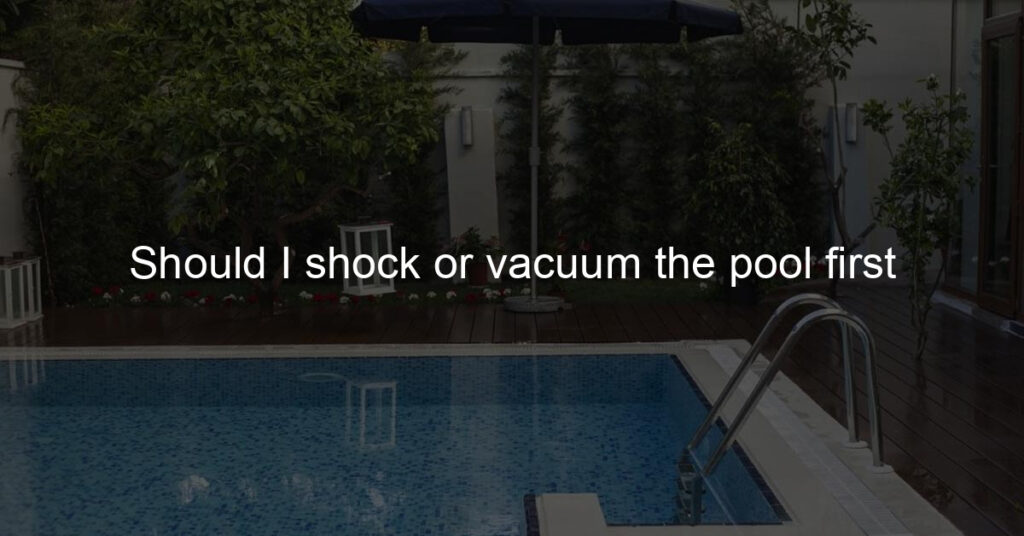The Science Behind Pool Shocking: How It Works
Pool shocking is a critical aspect of pool maintenance that involves adding a high dose of chlorine or non-chlorine sanitizer to the water. The purpose of shocking is to eliminate chloramines, which are formed when chlorine interacts with body oils, sweat, and other organic matter.
Chloramines are responsible for the typical “chlorine smell” of pool water and can irritate swimmers’ eyes and skin. When you shock your pool, you’re essentially raising the chlorine level high enough to break these chloramines down. This process is also effective in killing bacteria, algae, and other contaminants. As a result, your pool water stays clear and safe for swimming.
Different Types of Pool Shocks: Pros and Cons
There are primarily three types of pool shocks available: calcium hypochlorite, dichlor, and non-chlorine shock. Calcium hypochlorite is the most common and cost-effective type of shock. It contains about 65-75% chlorine and is effective at eliminating bacteria and algae. However, it needs to be pre-dissolved before use, requires sunlight protection, and can increase your water’s hardness.
Dichlor, on the other hand, contains cyanuric acid, which protects the chlorine from sun degradation. It’s more stable and less harsh than calcium hypochlorite but can lead to a build-up of cyanuric acid over time. Non-chlorine shock, or potassium peroxymonosulfate, is quick-acting, doesn’t need pre-dissolving, and doesn’t add any chlorine to your water, making it swim-ready sooner. The downside is that it is more expensive and less effective at killing algae.
Proper Techniques for Vacuuming Your Pool: Step by Step Guide
Vacuuming a pool is similar to vacuuming a carpet. Start by connecting the vacuum to the skimmer box to create a suction effect. Make sure the vacuum head is submerged before switching the pump on to avoid air entering the system. Move the vacuum across the pool bottom slowly to avoid stirring up the debris, which could cloud your water. The goal is to lift the debris, allowing the vacuum to suck it up.
Overlap your strokes as you would when mowing a lawn to ensure you cover the entire pool surface. Be sure to keep an eye on the pool filter pressure gauge. A significant increase could indicate a blockage in the system, at which point you should stop vacuuming, clean the filter, and then continue.
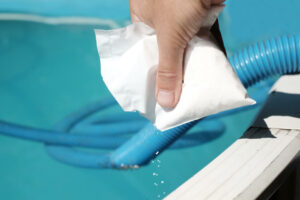
Pool Maintenance: When to Call a Professional
While many aspects of pool maintenance can be handled on your own, certain situations warrant the expertise of a professional. These can include complicated tasks like repairing pool equipment, replacing liners, detecting leaks, or addressing significant water balance issues.
Furthermore, a professional pool service might be necessary if your pool has not been maintained for a while, has severe algae growth, or the water becomes too cloudy or discolored despite your best efforts. Routine inspections and maintenance from professionals can also extend the lifespan of your pool and equipment.
Benefits of Regular Pool Maintenance: Health and Economic Perspectives
Regular pool maintenance can provide several health and economic benefits. From a health perspective, consistent upkeep helps maintain the balance of chemicals in your pool, reducing the risk of skin irritations and eye infections. It also prevents the growth of harmful bacteria and algae, making your pool safer for swimming.
Economically, regular maintenance can prevent costly repairs in the long run. By promptly addressing issues like minor leaks, malfunctioning pumps, or small cracks in the pool surface, you can avoid major structural damages that can lead to substantial costs. Regular cleaning also extends the life of your pool and its equipment, saving you money in replacement costs.
Troubleshooting Common Pool Problems: Cloudiness, Algae, and Equipment Issues
Common pool problems often include cloudy water, algae growth, and equipment malfunction. Cloudy water is usually a result of unbalanced water chemistry, insufficient filtration, or environmental factors like heavy usage or rainfall. Regular testing and adjusting of water chemistry, along with consistent filtration, can address this issue.
The algae growth can be attributed to low chlorine levels or poor circulation and can be resolved by shocking and brushing the pool. Equipment issues can vary from leaks in the pool to malfunctioning pumps or filters. While some minor issues can be handled yourself, more complex problems often require professional intervention.
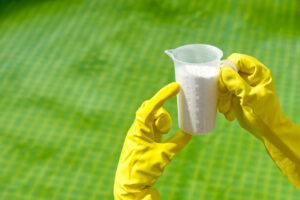
Year-Round Pool Care: Seasonal Considerations for Maintenance
While pool maintenance is often thought of as a summer task, pools require year-round care. The maintenance routine can vary based on the seasons. During summer, regular cleaning, chemical balancing, and filtration are necessary due to high usage. In fall, the focus shifts to removing leaves and debris and preparing the pool for winter.
Winter maintenance involves winterizing steps such as lowering water levels, adding winter chemicals, and covering the pool to protect it from harsh weather conditions. Springtime maintenance includes removing and cleaning the pool cover, refilling the pool, re-balancing water chemistry, and getting the pool ready for use.
Understanding Pool Chemistry: pH, Alkalinity, and Chlorine
Understanding the chemistry of your pool water is essential for maintenance. The pH level measures the acidity or basicity of the water, with 7.4-7.6 being the ideal range. A pH level below 7.4 can cause skin and eye irritation, while a level above 7.6 can result in cloudy water and scaling. Alkalinity acts as a buffer for pH, helping to stabilize it against rapid changes. The ideal range for total alkalinity is 80-120 ppm.
Chlorine is a sanitizer that kills bacteria and algae. It’s available in many forms, with each having different methods of application and effects on your pool chemistry.
Pool Maintenance Tools: A Comprehensive Guide
Several tools are essential for maintaining a clean, safe pool. These include a pool vacuum for removing dirt and debris, a skimmer net for clearing surface debris, and a pool brush for scrubbing the walls and floor. A water testing kit is a must-have to monitor the chemical levels in your pool.
Other equipment includes a pool cover to protect the pool when not in use, pool chemicals for adjusting the water balance, and a pool filter and pump system for circulating and cleaning the water. Each tool plays a vital role in maintaining the aesthetics, safety, and longevity of your pool.
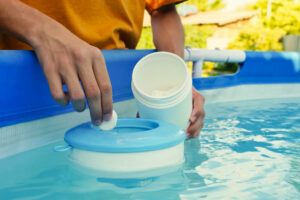
Safety Measures During Pool Shocking and Vacuuming
Safety should be a top priority when performing pool maintenance tasks like shocking and vacuuming. When handling pool chemicals, always wear protective gear like gloves and goggles to prevent any accidents. Always add chemicals to water, not the other way around, to prevent dangerous reactions.
Keep chemicals out of the reach of children and pets and store them in a cool, dry place. While vacuuming, avoid doing so during a storm or when there is lightning, as water can conduct electricity. Also, be mindful of your pool’s electrical systems to avoid any risk of electric shock.
The Impact of Weather Conditions on Pool Maintenance
Weather conditions significantly impact pool maintenance. Hot, sunny days can lead to the evaporation of chlorine, making your pool vulnerable to bacteria and algae. This means you might need to add chlorine more often during hot weather.
Heavy rains, on the other hand, can dilute your pool chemicals, altering the water balance. Rain can also introduce debris and pollutants into your pool, necessitating additional cleaning. Cold weather or freezing temperatures call for winterizing your pool to protect it from potential damage.
Routine vs. Deep Cleaning: Understanding the Differences and When to Do Each
Routine cleaning refers to the regular tasks carried out to maintain your pool, such as skimming, vacuuming, and checking the water chemistry. These tasks are usually performed at least once a week or more frequently during periods of heavy use or certain weather conditions. Deep cleaning, however, is a more thorough process that might include tasks like scrubbing the pool tiles, cleaning the pool filter, or shock-treating the water to kill algae and bacteria.
While deep cleaning might only be necessary a few times a season or when specific problems arise, it’s an important part of maintaining a clean and healthy pool.
How to Identify When Your Pool Needs Shocking or Vacuuming
Telltale signs that your pool needs shocking include the presence of algae, cloudy water, or a strong chlorine smell. Algae growth is a clear indicator that your sanitizer levels are insufficient and shocking is needed. Similarly, if your pool water becomes cloudy or has a strong chlorine smell, it suggests the presence of chloramines, which can be eliminated by shocking.
Signs that your pool needs vacuuming include visible debris or dirt on the pool floor or an increase in water cloudiness due to suspended particles. Regularly checking your pool can help you identify these signs and take appropriate action.
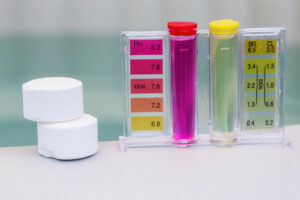
Green Pools: Causes, Solutions, and Prevention
Green pool water is primarily caused by algae growth, which occurs when the chlorine level in the pool is too low. Other factors such as poor circulation or filtration, high pH levels, or warm weather can also contribute to this problem. To turn a green pool clear, you need to eliminate the algae.
This is done by shocking the pool, followed by thorough brushing and filtration. To prevent your pool from turning green, maintain appropriate sanitizer levels, regularly brush and vacuum your pool, ensure your filtration system is working properly, and maintain balanced water chemistry.
Debunking Pool Maintenance Myths: What You Need to Know
Several myths surround pool maintenance, such as the belief that a strong chlorine smell means the pool is clean. In reality, a strong chlorine smell indicates the presence of chloramines, which form when chlorine reacts with impurities and suggests the pool needs to be shocked. Another myth is that clear water means the pool is clean.
While clear water is a good sign, it doesn’t guarantee that the chemical levels are balanced or that there are no harmful microorganisms. Regular testing is needed to ensure water safety. Lastly, many people believe that they don’t need to shock their pool if they use a chlorine tablet. However, while chlorine tablets maintain a steady chlorine level, shock treatments are necessary to eliminate chloramines and kill bacteria or algae.
Conclusion
Maintaining a clean, safe, and sparkling pool requires a consistent, dedicated approach to both regular and deep cleaning. The practice of shocking and vacuuming, along with understanding the pool’s chemistry, plays a crucial role in this maintenance regime. Knowing when and how to shock or vacuum your pool, recognizing signs of algae growth or imbalanced chemicals, and debunking pool maintenance myths all contribute to a better swimming environment and the longevity of your pool.
With the right tools and a firm grasp of pool maintenance requirements, you can enjoy the benefits of your pool year-round. Even weather conditions and seasonal variations can be effectively managed with the right knowledge and a proactive approach. The more you understand about the complexities of pool maintenance, the more efficient and effective you’ll become at ensuring a great swimming experience.
Remember, your pool is a substantial investment and a source of enjoyment. Regular upkeep not only maintains its functionality and beauty but also ensures it remains a healthy and safe space for all to enjoy. No matter the effort, the reward of a well-maintained pool is definitely worth it.

